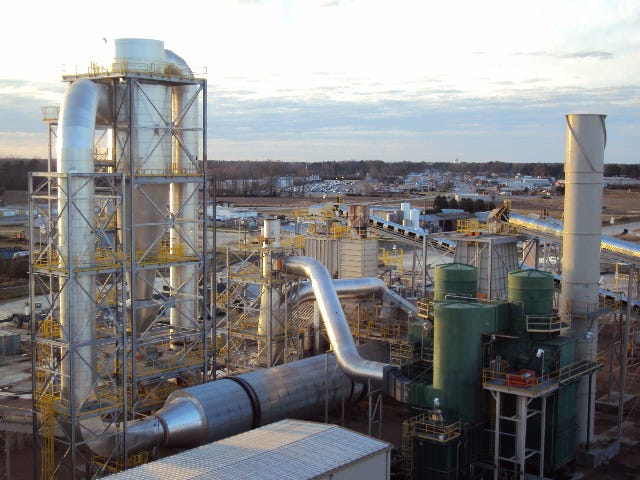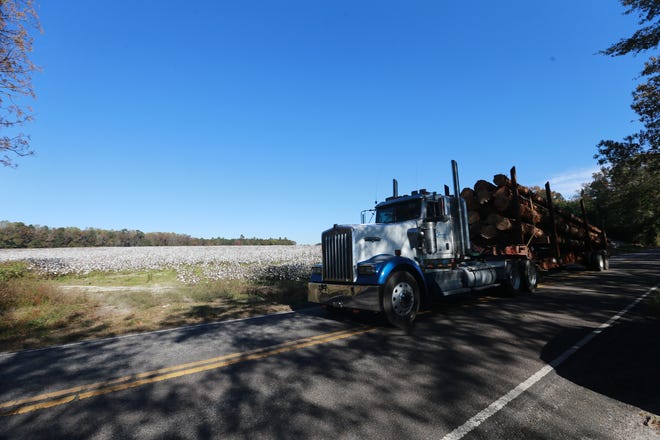Could wood from NC forests soon be fueling your next airline flight?
Gareth McGrath
USA TODAY NETWORK

Think North Carolina’s extensive forests and your next thought probably isn’t a whirling commercial aircraft engine.
But a new partnership announced last month could see “green” aviation fuel derived from Tar Heel State trees helping connect cities and countries around the world.
Last month, Enviva, which turns trees and wood products into pellets that are burnt for energy, announced a deal with Alder Fuels to supply up to 750,000 metric tons (2,204 pounds each) of wood biomass to the privately owned green crude producer beginning in 2024.
The move would help meet an urgent demand by the aviation industry to develop a greener power source. As climate change concerns grow and businesses come under greater pressure from governments, customers and investors to lower their carbon footprint and production of atmosphere-warming greenhouse gases, the airlines find themselves in a thorny situation.
While not a huge producer of greenhouse gases when compared to other industry sectors, the aviation market is often “shamed” by climate activists because it involves a relatively small number of individuals producing a large per-capita amount of emissions. According to the Environmental and Energy Study Institute(EESI), passenger air travel produced the highest and fastest growth of individual emissions before the COVID-19 pandemic.
Overall, aviation produced 2.4% of worldwide carbon dioxide emissions in 2018. While this may seem like a relatively small amount, the industry would rank as the world’s sixth worst polluter − squeezed between Japan and Germany − if it was a country. And, according to the EESI, commercial aviation emissions could triple by 2050 based on projected passenger growth forecasts.

Several websites have sprung up in recent years to tell air travelers how much carbon their trip will be emitting, how much their local airport is polluting, and whether there are ways to reduce their footprint (such as by buying offsets). The website Airport Tracker, for example, states that flight emissions from Charlotte-Douglas International Airport, which ranks 19th in the country for passenger pollution, are equivalent to the yearly emissions from 1.6 million cars.
But keeping a 100,000-pound airliner in the sky requires a lot of power, and solar and electricity aren’t really viable options for the industry if they want to keep long-distance air travel economically sustainable.

That’s led to a big push to develop and quickly scale up renewable fuel sources, especially after major U.S. airlines committed to achieving net-zero carbon emissions by 2050.
“SAF (sustainable airline fuel) made from renewable biomass and waste resources have the potential to deliver the performance of petroleum-based jet fuel but with a fraction of its carbon footprint, giving airlines solid footing for decoupling greenhouse gas emissions from flights,” states the U.S. Department of Energy’s Bioenergy Technologies Office.
As part of that effort the government has launched the “SAF Grand Challenge,” with the goal of having 3 billion gallons of SAF produced in the U.S. by 2030 and 35 billion gallons by 2050. President Biden’s Inflation Reduction Act (IRA), passed in August, includes significant tax credits and other incentives to help support the initiative.
According to the companies, the 750,000 metric tons of wood biomass that Enviva plans to provide to Alder would equate to approximately 37 million gallons of SAF.
Pellet controversy
So how do North Carolina forests fit into all of this?
Enviva, the world’s largest biomass producer, has invested significant sums in Eastern North Carolina to take advantage of the region’s extensive forests. Those investments include four mills in North Carolina − Sampson County, Northampton County, Hamlet and Ahoskie − along with an export terminal at the Port of Wilmington. Facilities are also located in six other Southeastern U.S. states.
According to Enviva, the company supports more than 1,800 jobs across North Carolina and has invested more than $675 million in the state.

The impetus for the company’s growth was a decision by the European Union more than a decade ago to push its member states to shift from using polluting fossil fuels like coal as a power source to renewable energy, such as solar and wind. Also included on that list was biomass, which suddenly made wood a product in high demand. That made the more than 50 million acres of forests stretching from Virginia through the Carolinas, Georgia, Alabama and Mississippi a hot commodity.
The timing of Europe’s move, one of many the continent has adopted as it looks to curb greenhouse gas emissions, couldn’t have come at a better time for North Carolina’s timber owners and industry. With the market for pulp and many wood products shrinking, there’s pressure to keep working forests that cover much of the Carolina coastal plain in demand as economic catalysts for rural areas where a mill is often the largest employer and there are few other economic drivers. Sustaining the green cover in one of the fastest-growing states in the country, especially as population pressure and sprawl pushes farther and farther out from North Carolina’s booming cities and coastal areas, is another factor to sustain the state’s timber industry.

But environmentalists and climate activists have questioned how effective the company’s stated goal of helping European power plant operators reduce greenhouse gas emissions from their coal-fired plants can be if the pellets have to be harvested, produced and then shipped across the Atlantic.
Sam Davis, a conservation scientist with the Asheville-based Dogwood Alliance, said burning biomass emits similar or more carbon per unit of energy generated than other methods, including using coal. That makes it pointless for governments to subsidize the use of biomass as a fuel when it’s polluting more than the fuel it’s replacing.
“If we’re serious about reducing carbon emissions, we can’t rely on accounting to fix the problem,” Davis said. “We need to stop emitting.”
Hundreds of climate scientists also have written to world leaders, including President Biden and leaders of the European Union, stating that cutting down and burning forests that store carbon, which is then released into the atmosphere, to reduce overall carbon emissions is counter intuitive.
Environmental justice concerns also have been raised about the impacts from the plants, which are mostly located in marginalized and poor communities, on nearby residents. Enviva has said it meets all federal and state regulations regarding emissions. The company also says it follows a "responsible sourcing policy," only buying wood from landowners who intend to keep their land as forest.
‘Significant impact’
Moving into another renewable energy market, especially one largely for domestic consumption, isn’t likely to generate as much criticism directed at Enviva, although that could change if timber harvesting increases to meet demand if the endeavor proves economically viable, popular with industry, and takes off.
Officials with Enviva and Alder are pitching the use of wood products for sustainable aviation fuel as a win-win on many levels beyond decarbonizing air travel.
According to Enviva, the biomass provided to Alder wouldn’t be processed wood pellets, but the “least merchantable, low-value wood from a timber harvest, such as forest byproducts like tree tops, limbs and commercial thinnings.”
The company said using a renewable product like trees for fuel is also a cleaner, safer method than extracting oil from deep in the ground, which is a one-shot deal that has to be stopped and investments scrapped once the petroleum is pulled out.
Then there are the local economic impacts if the proposal succeeds.

The endeavor could represent a shot in the arm for struggling rural communities and timber landowners.
According to N.C. State University, the total economic impact of the forest sector in the state was $32.8 billion in 2020 and it directly employed 70,200, although pandemic-related factors has led to the industry facing economic headwinds and shedding jobs.
Dr. Rajan Parajuli, a forest economist with N.C. State, said while the market for many wood products has declined in recent years, the demand for low-value stock that’s used in everything from sanitary products to drywall has remained relatively strong.
“It would definitely have a significant impact in a market that’s already competitive,” he said of the wood-to-SAF deal. “It could be a huge deal, to be honest.”
Expanding market opportunities for timber products could also help boost or at least sustain wood prices, providing an additional incentive for private landowners to keep their land as forests, Parajuli added.
Alder has yet to announce a site for its new SAF refinery, although the D.C.-based company has said it will be in the Southeast.

In its release announcing the partnership with Enviva, Alder also hinted that the partnership could be the start of something much bigger.
“Decarbonization of our entire economy is driving massive demand for the next generation of sustainably sourced renewable fuels," stated Bryan Sherbacow, Alder Fuels’ president and CEO. “The size of the market for our product is equal to the petroleum market it replaces.”
Reporter Gareth McGrath can be reached at GMcGrath@Gannett.com or @GarethMcGrathSN on Twitter. This story was produced with financial support from 1Earth Fund and the Prentice Foundation. The USA TODAY Network maintains full editorial control of the work.